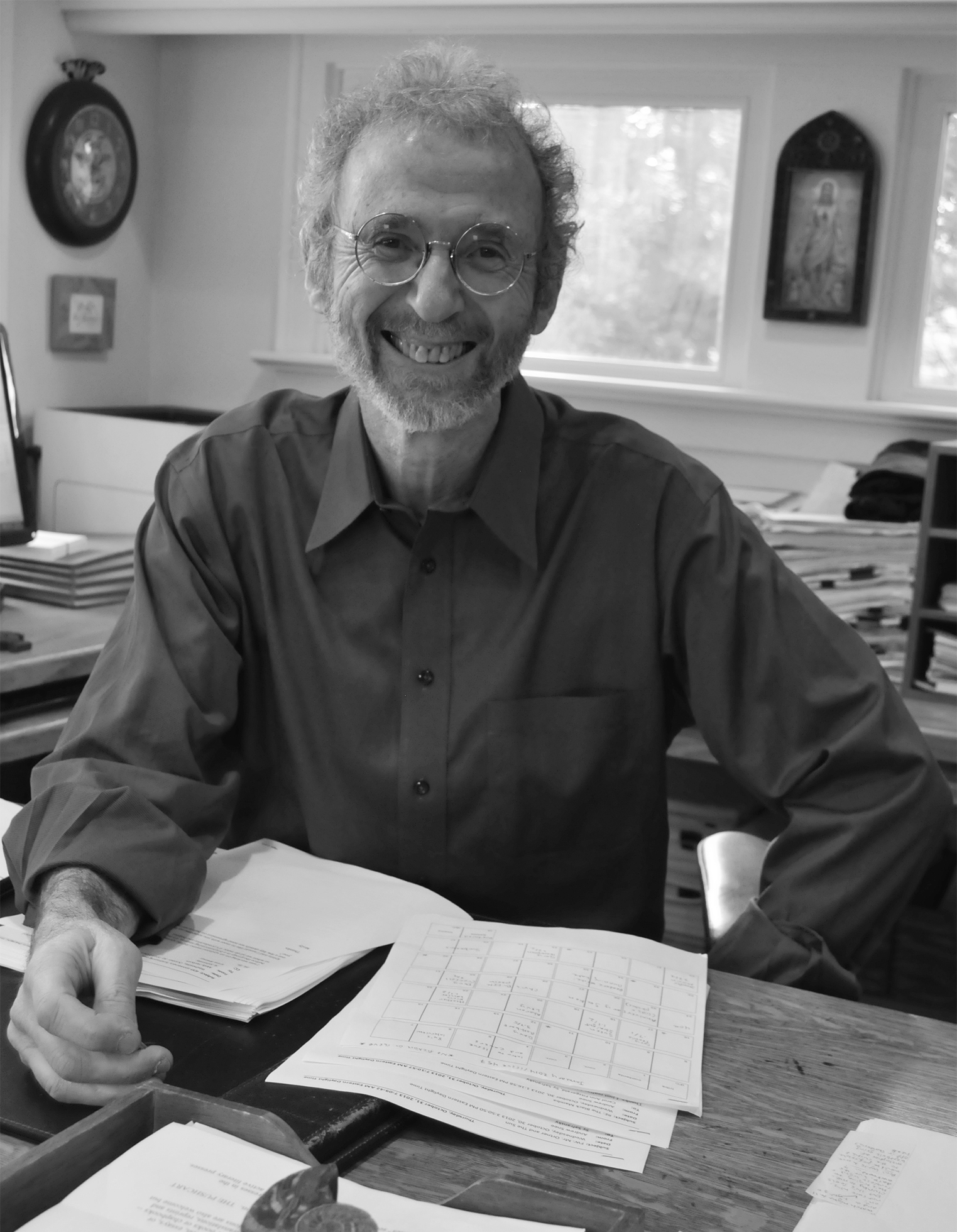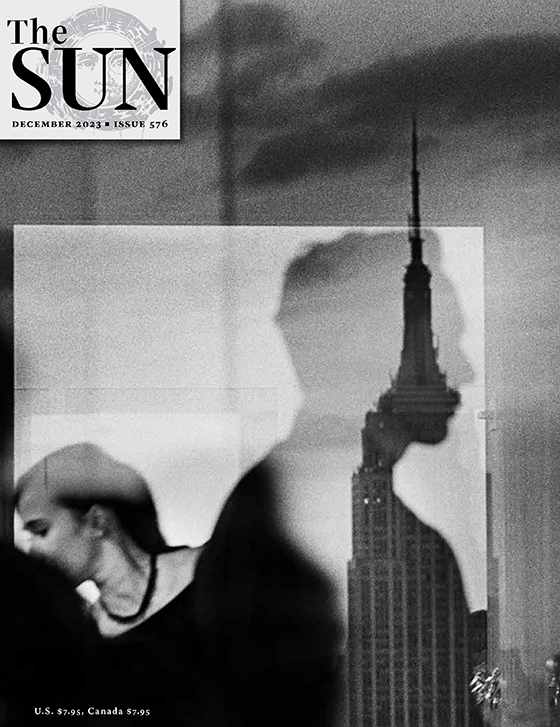Many years ago, at a conference, the Dalai Lama was asked, “What do you think is going to happen in the world fifty years from now?” He paused, then looked up and replied, “I don’t have any idea.” Laughing, he said, “I don’t even know what kind of tea I’ll be having with dinner tonight. How could I possibly know what will happen in the world fifty years from now?”
If I’d been there, sitting close to that most famous of Buddhist teachers, I’d have laughed, too. After all, my friends thought I was being unrealistic when I started The Sun in 1974 with no staff, no office, and no money. They were right, of course. But one day at a time, week after week, month after month, year after year, the magazine survived. In the midst of that, an implausible idea occurred to me: If I kept working hard, could I make sure The Sun would be around for fifty years?
Time went by. The Sun and I got older. In 2020, when I turned seventy-five, our board of directors became increasingly concerned about what would happen if, for whatever reason, I was unable to continue as editor. I had the same concern. I knew how easy it is to be in denial about the effects of aging — having trouble finding the word for a familiar object or taking too long to compose a simple memo. I told the board that, if possible, I wanted to fulfill the fifty-year goal I’d set for the magazine and for myself. After all, I thought, 2024 wasn’t far away. And, with my heartfelt support, the board voted for The Sun’s publisher, Rob Bowers, to succeed me when I stepped down.
Finding the right people to work at The Sun isn’t easy — for us or for them. Getting to know a person can take time, and someone who seems just right at first often isn’t. Over the years I’ve met hundreds of candidates: too good to be true, too hot to handle, more capable than they think, not capable enough. How thankful I am that Rob walked into my office eight years ago. In 2015 I hired him as The Sun’s business manager, and since then I’ve come to think of him as a brother, a comrade, and a better friend than I could ever have imagined.
Though his route to the magazine was somewhat circuitous — Rob has worked in finance, trained to be a Zen monk, and even run his own organic, biodynamic farm — he made it clear straightaway that The Sun was home to him. When he joined the staff, it felt like a missing puzzle piece snapping into place. I know him as a man of humility, familiar with the world of nature, with sudden storms, with sadness and grief. I’ve been impressed again and again by his intelligence and thoughtfulness, and by his understanding of what does and doesn’t belong in the magazine. I’ve been thankful for his business acumen and depth of experience with nonprofit organizations. I appreciate his compassion and curiosity. He’s a man who forgives easily and knows a thing or two about human folly. Tall and strong. Blue eyes. Pure in heart. He’s calm. (I’m often anxious.) He ponders what’s on his mind before speaking. (I start talking without knowing what I’m going to say.) He works very hard, as I have for the last fifty years. He also shares my sense of humor, which I’ve always appreciated.
In January my implausible idea of working at the magazine for fifty years will have come to pass, and I will comfortably step into a new role as editor emeritus.
That having been said, it’s hard for me to say goodbye.
When I started The Sun, I was living in a single room the size of a monk’s cell. But it was big enough for a small desk, a small bed, and too many books. There was a window outside of which birds sang each morning. I had just quit a job I hated and split up with the woman I loved. I was broke. Someone who barely knew me, yet was sympathetic to my dream of starting a magazine, had offered me the room. I edited the magazine there and kept the names of the subscribers — all eight or nine of them — in a folder in my desk. Would there ever be enough readers to support my dream? I had no idea.
The Sun has come a long way since 1974, when I sold the first issues on the street, barefoot and with hair down to my shoulders. The magazine has a wider audience now. I have fewer curls. Yet what was important to me then is still important to me today: putting out a publication that celebrates the beauty and the sadness of being alive. The Sun is an experiment — an idea born of passion and youthful idealism, supported by the hard work of many people, and kept alive by readers’ appreciation for an honest story well told.
Near the end of last year I decided to step away from the daily task of producing each issue and turn my attention to The Sun itself. I wanted to write about the magazine, and the people I’ve worked with, and the writers and the poets and the photographers I’ve cherished, and the lessons I’ve learned, and the mistakes I’ve made. So many mistakes. So much to say. I wanted to write about why I started The Sun, about how it has changed, about how the world has changed, and about how I’ve changed.
But then something unexpected happened. On October 23, 2022, I went to a doctor and found out that my brain is unraveling. An MRI showed that I have severe cerebral atrophy leading to impaired language, executive function, and memory. And I probably have Alzheimer’s.
I used to have a brain. Now I’m not so sure. In fact, I’m uncertain about so many things.
Rather than writing about The Sun, I’ve been reading about dementia. Until a year ago I’d never paid any attention to the subject. Now it’s dementia, dementia, dementia all the time. Sometimes I want to say, Fuck dementia!
When I sit down to write, it’s hard for me to understand what I’ve written. My brain is confused. And so is my heart. Sometimes a friend will read my pages out loud, and I’m amazed: Is that really what I wrote? After editing a magazine for most of my life, I’m a man who no longer knows how to spell a word correctly. All those words lost in the cloud, no way to get them back. I don’t know how long I’ll be able to remember the names of the people I’ve worked with for decades. Or the names of my daughters, or my grandchildren, or my wife, or myself. It’s difficult to follow instructions or to read a clock. I can’t do any math. I’m sometimes confused about what day, month, season, or year it is.
I don’t know how much more writing I can do. Nonetheless I am writing, and I’m thinking, and I’m grateful to be alive. I’m thankful for the good hearts and strong minds of the people who have worked with me these many years at The Sun.
Dementia is a horrible disease. Right now I’m in the mild stage. You don’t want to know what the later stages bring. This disease starts in a small region of the brain, then keeps spreading throughout. As the days go by, I know, writing will become more difficult. Sooner or later I won’t be able to find a single word, never mind the perfect word — just as a friend with Alzheimer’s (whose name I can’t remember) couldn’t find the right words, or any words at all.
For now I want to stop worrying about dementia and sit at my desk and keep writing as best as I can. As my friend Robert Bly — one of American’s most celebrated poets, who also had Alzheimer’s — wrote, “Longing / To find you in a phrase, and be close / There . . . Happy in the change of a single word.”
And when the time comes, and I hopefully find myself in heaven, perhaps there will be a desk I can sit behind. How wonderful that would be: a man like me with a desk in heaven.





